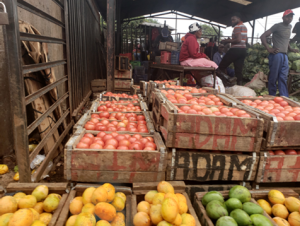There are times when the market is more important than inputs like seed, fertilizer and capital but very few farmers invest in understanding the market and knowing their customers. The situation is worse in African territorial markets where customers are as diverse as the commodities such that knowing your customer may not mean keeping that customer. Farmers end up just producing for an unknown customer and deliver commodities in the market where competition ends up devaluing commodities which should be fetching better prices if markets are properly organized for fair trade.

The power of a distinct commodity and identifying niches
While it may not be practical to expect every farmer to first find a market before growing anything, the quality of market information determines whether a great commodity generates great income. When farmers invest in knowing their customers and knowing the market, they understand barriers to entry as well as the maturity of the market including market behaviours that guarantee stable income for different classes of farmers. Market intelligence enables farmers to understand whether their product is distinct in the market or not. That empowers them to successfully insert themselves into the market, with a clear path to profitability. For instance, having carefully studied sweet potato market dynamics and customers, farmers can time production so that they harvest and get into the market when everyone else does not have the commodity. Instead of earning $25 per bag, the farmers walk away with $60 per bag. It is after participating in the market for many years and witnessing all the ups and downs that farmers can hone strategies for identifying underserved consumer niches and focusing on satisfying different customers.
Understanding how consumers are feeling
They may not have degrees in marketing but most African food traders and vendors have becoming experts in connecting with consumers at an emotional level. By looking at how consumers move around tomatoes, potatoes, leafy vegetables and various types of fruits, traders and vendors can tell how consumers are feeling and what prompts them to buy particular commodities. Most consumers bring all human senses – smell, feel, touch, hear and taste. Traders respond by encouraging consumers to touch, taste and even shake commodities like cabbages in order to hear if the inside is hollow. Unless all these aspects are documented and shared, many farmers who do not spend time in the market will continue bringing commodities without targeting specific needs of customers.
While formal companies like retailers are fond of generating numbers designed to influence customers through persuasive advertising, territorial market traders and vendors know the importance of being creative in getting to the hearts and minds of diverse consumers. For instance, whereas seed companies breed for large fruit sizes, traders and vendors know how many consumers are put off by large cabbages, pumpkins and water melon. Medium sizes tend to be the most overwhelming preference by several consumers, especially younger consumers. It means, farmers who bring large sizes to the market have to know their customer at a persona level.
Luxuries becoming necessities
African territorial markets are also beginning to show how consumer demand changes the profile of a commodity from being a luxury to a necessity. For instance, carrots, peas, peppers used to be luxuries in most rural communities where only one or two leafy vegetables like Covo and Rape as well as tomatoes where the produced as necessities. Increasing production and distribution of luxuries from territorial markets to rural areas is seeing these luxuries becoming necessities. Fruit juices that used to be a preserve of urban consumers are now easily finding their way to rural shopping centres where solar energy and rural electrification is enabling refrigeration. These are some of the key trends that farmers have to master so that they can offer compelling products that can lure a broad loyal base of consumers.
How territorial markets give food commodities an indigenous face
The same kind of value of addition of indigenous commodities that is being promoted in cities is also being promoted in rural areas where mechanization and rural electrification is now proliferating. It means rural entrepreneurs have to give their products a unique face and taste in order to compete. That also requires a strong indigenous knowledge base because the salient nature of indigenous knowledge systems (IKS) is that they quietly sustain communities while express craft, care and high thoughtfulness in the way knowledge is shared as a public good. Putting a price to products produced using such unique IKS so that the products command a premium price is still a challenge. Farmers and traders in territorial markets make better decisions because the right IKS connections are in place but cannot be easily touched and given a price. The process seems so seamless that most people don’t even realize IKS are at play. However, people notice when something breaks down for instance if a fire burns down the market which has been a quiet source of indigenous seeds like what happened to Mbare retail market in Harare on 8 October 2024.
Like all forms of knowledge, IKS needs to be visible and tangible before things fall apart in farming communities and territorial markets. That is why documenting the marketing process and practice is fundamental toward guaranteeing Return on Investment (ROI) in agriculture and food systems. Through African territorial markets, many people are beginning to notice the importance of indigenous food as a solution to lifestyle diseases like diabetes and others. Curiosity about what is happening to indigenous food, consumption patterns and how it is marketed can open new career pathways for young people especially graduates keen to apply their knowledge in real life.
Charles@knowledgetransafrica.com / charles@emkambo.co.zw /
Website: www.emkambo.co.zw / www.knowledgetransafrica.com
Mobile: 0772 137 717/ 0774 430 309/ 0712 737 430
